The Mole People
if anyone were to ask you about Universal horror and science fiction films from the 1940s and '50s, you would probably come up with at least one of the following franchises: Frankenstein, Dracula, The Invisible Man, The Creature from the Black Lagoon or The Mummy. Universal made scores of pictures during this time, many with a B-movie feel and those would probably extend to this 1956 offering from director Virgil Vogel.
The Mole People begins with an introduction by Dr Frank Baxter, Professor of English at the University of Southern California, who explains the various 'Hollow Earth' theories in which academics through the centuries have believed that we live on the inside of the Earth and look down on the Sun and other planets or on different layers of a mazelike interior.
It then moves on to the film itself which follows an archaeological expedition in Asia led by Dr Roger Bentley, Dr Jud Belarmin and Dr Paul Stuart who believe that they know where to find the most relics from the Sumerian era. The expedition starts well as they come across a giant tablet protruding from the rocks which they remove and study and, because of its location, high above the floodplain, indicates that it is over 5000 years old because of an ancient flood that would have washed it away had it been any lower. Whilst Dr Bentley is studying the Sumerian text back in their tent, there is a huge earthquake that causes the tablet to fall and smash on the floor which seems to follow the prophecy written on it except they didn't take it in vengeance, only for academic study.
The earthquake may have destroyed the tablet, but it also dislodged some artefacts higher up the mountain including a solid gold oil lamp and one of the local guides says that, in order to get to where the heart of the civilisation was, they must climb up the mountain to a spot way above the halfway point. Despite one of their party, Dr Stuart, being elderly and not in the best of shape, they set off and, despite another couple of earthquakes, reach their destination to find a proper Sumerian temple and outer buildings which is, for the archaeologists, the find of a lifetime.
However, things don't quite go to plan as, when they are dozing in the sunshine, they are hooded and dragged underground through a hole by a 'mole man' and brought before some strange albino people who are forcing the 'Mole Men' to dig by feeding them mushrooms and whipping them. The society is run by Elinu , a high priest, and Etienne Lafarge, a professor and the president, along very strict guidelines as, because they live entirely underground, food and water is extremely limited so, if the population exceeds the food allowance, some are sacrificed to the goddess Ishtar.
When Roger, Jud and Paul show up with their torch (or flashlight, if you're American), the high priest, Elinu , believes that they are messengers from Ishtar because they carry the light that can blind and hurt them. In reality, they are so sensitive to the light from being born and raised in the dark that the artificial light really does hurt them but Roger and Jud are quite happy to play along at being messages from a God as it means they won't be killed and are afforded things like a slave. Their slave, Adad, is a beautiful Caucasian with brown skin who has been shunned all her life because of her colouring with Elinu declaring her 'marked'.
Eventually, she and Roger fall in love whilst the archaeologists figure out that the mole people are used to dig up mushrooms -- the only foodstuff that will grow in the dark -- for the albinos to eat. Being from a more civilised country and one that has abolished slavery, they don't agree with the society's hierarchy and contemplate inciting revolution but they know that, if caught, they will be sent to die in the 'fire of Ishtar'.
As far as Universal horror/science fiction films go, The Mole People is certainly no classic but is one of those better-than-mediocre films that is probably the equal of some of the latter franchise films as it isn't just a simple monster movie of the kind that rolled off the production reel at Universal and other studios during the 1950s and '60s to play on the fear of animals being mutated by radiation. It has an interesting setup and reasonably intelligent script which incorporates a whole new society, a couple of suitably evil bad guys, a love interest and decent killer creatures.
In terms of the cast, John Agar (Roger) and Hugh Beaumont (Jud) are very good and surprisingly far from wooden whilst Cynthia Patrick does a fine job as Adad, looking fantastic in a white dress which emphasises her blonde hair and olive skin whilst the two villains of the piece, Alan Napier and Nestor Paiva are terrific as the high priest and eminent professor respectively. It's quite amusing to think that Alan Napier would go on from this to play Alfred in the Batman series.
If this were acted and directed differently, it could have worked equally as well as high camp but part of the reason why this is so watchable is because it is all so earnest with all of the dialogue and acting played completely straight with no laughs at all during the film. Saying that, there is a good laugh when Roger has run out of tobacco for his pipe and innocently asks Jud if he "has ever heard of anyone smoking dried mushrooms"; unsurprisingly, Jud replies is in the negative. Virgil Vogel's direction is better than adequate and he does very well with the different sets and 'location' shooting, splicing in archive footage of mountain climbers to give the illusion that the actors are really climbing a large mountain and setting up camps along the way. The screenplay, by László Görög is certainly an ambitious one in terms of its historical and theoretical background but falls into stereotype when stereotype is called for in terms of the 'hero' falling in love with the slave girl and doing what he can to free her.
This may not be the finest horror/sci-fi film that Universal ever released but it is eminently watchable and one that will probably hold up to repeated viewings.
The Disc
The Picture
Generally, the 1.33:1 monochrome picture is clear with good contrast and sharp edges but, when the stock footage is spliced it, you really notice the scratches, dirt and other detritus on the old material. Luckily, this doesn't continue and when it switches back to the footage which he shot on set, it is surprising just how good that looks in comparison.
The costumes are very good and Alan Napier has a fantastic false moustache which he occasionally strokes in typical villain style -- both Napier and Paiva have wonderfully outrageous gowns and headgear to separate them from the other albinos who have much more modest attire.
The Sound
The Dolby Digital 2.0 mono soundtrack is clear enough despite a little bit of background hiss so the dialogue is sharp and well presented and it is impressive just how good an earthquake sounds coming from the centre channel in plain old mono when you are used to such natural disasters coming from all around you in a 5.1 surround mix.
There is a decent score by persons unknown as there is no credited composer although the IMDb lists Heinz Roemheld, Hans J. Salter and Herman Stein as uncredited composers but I have no idea where the evidence for this comes from and how reliable the IMDb is in this respect.
Final Thoughts
The Mole People is a well constructed and executed film with decent performances throughout and fine work from those behind the camera in terms of the cinematography, editing, art direction and costume design. If you like the horror/science fiction/fantasy films that Universal released during the 1950s then there is much to enjoy here.
It is a slight shame that the disc is completely vanilla but I imagine that, in terms of outlay versus return, it probably wasn't worth the expenditure for a commentary. Otherwise, this is another welcome release from Final Cut Entertainment followingTales from the Crypt andRevenge of the Creature -- I look forward to finding out what they have in mind for their next release.
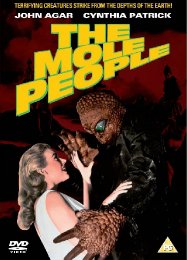
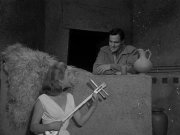
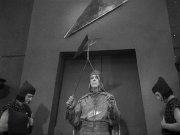
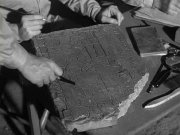
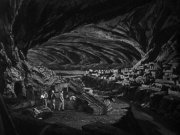
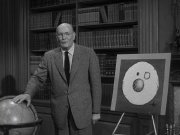
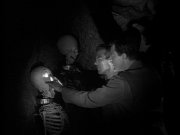
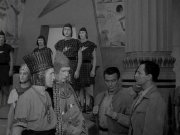
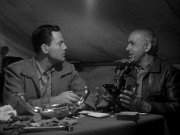
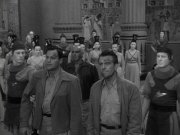
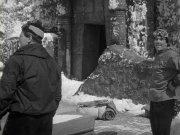
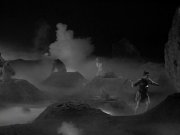
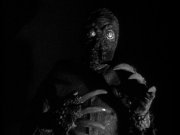
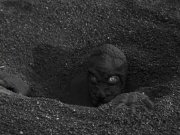







































Your Opinions and Comments
Be the first to post a comment!